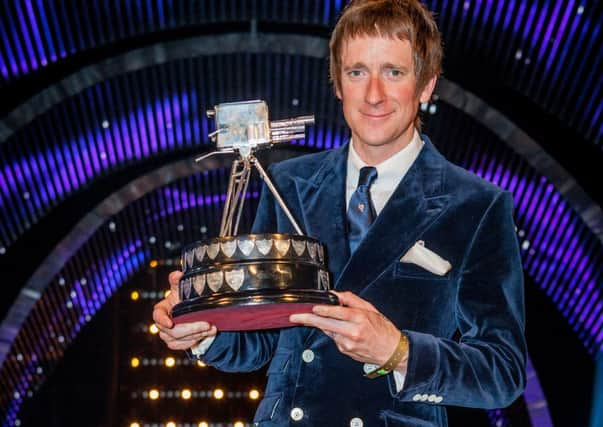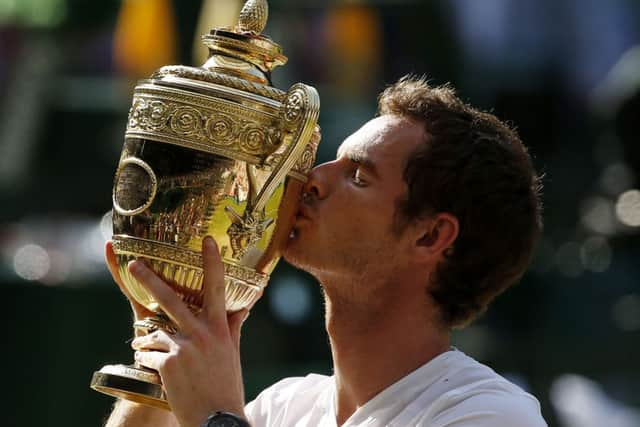‘To me it is the prize that every sports competitor wants more than any other’


THE prestige of the BBC Sports Personality of the Year award only became clear to Sir Bradley Wiggins in the days, and weeks, after he captured the cherished prize 12 months ago.
“It’s the most iconic trophy in British sport, more so than the World Cup and FA Cup,” reflected the champion cyclist who followed up his historic Tour de France victory with an imperious victory in the Olympic time trial.“It’s an achievement that is judged across all sports.”
Advertisement
Hide AdAdvertisement
Hide AdThe king of the road should know. He had to beat the strongest shortlist ever assembled in the programme’s six-decade history following Britain’s unprecedented success at the Olympics and Paralymics – legendary runner Mo Farah did not even make the SPOY podium.


And it will be one of the biggest surprises in the history of this enduring show if Wiggins is not succeeded by Wimbledon history-maker Andy Murray when the 60th winner of the show is named at the First Direct Arena in Leeds on Sunday night.
Even though Murray, the first British winner of the men’s singles at the hallowed All England Lawn Tennis Club in 77 years, will be absent through training commitments in Florida as he recovers from back surgery, his absence is unlikely to be detrimental to his chances.
The bookmakers regard him as the hottest favourite in the programme’s history.
Advertisement
Hide AdAdvertisement
Hide AdIf training in America is the sacrifice that the likes of Murray and Farah, another no-show, have to make so that they have an even greater chance of winning – and inspiring a nation – in the future, then their supporters are likely to be charitable.
This, after all, is global sport in a professional era when every training session is subjected to forensic scrutiny by competitors and their entourages. One missed day, even for such a celebrated award, could make the difference in a Grand Slam final, or the final metres of a running race.
In short, it is indicative of the journey that both British sport, and SPOY, have undertaken since the very first programme was broadcast in 1954. Sunday’s star-studded show, lasting over two hours, will be watched by a 10,000-plus paying audience at a venue which was chosen to celebrate Welcome to Yorkshire and Leeds winning the race to host the 2014 Grand Départ of the Tour de France. The actual vote will be conducted by telephone poll, with some sports organising promotional campaigns to enhance the chances of their nominee.
Contrast this with the stuffy formality of 1954 when the inaugural show was staged at London’s Savoy Hotel. The programme lasted just 45 minutes and sports fans had to cut voting coupons out of the Radio Times, with the slips collated on the living room floor of the programme’s editor Sir Paul Fox.
Advertisement
Hide AdAdvertisement
Hide AdThis grandee of sports broadcasting had been instrumental in devising the concept at the end of a sporting year which had seen England and Surrey cricketer Jack Hobbs knighted; an 18-year-old Lester Piggott win a first Epsom Derby and Sir Roger Bannister’s sub-four-minute mile. Yet, when the votes were counted, this triumvirate, and others, had been eclipsed by Christopher Chataway – the man who had actually been Bannister’s pacemaker for his record-breaking run. Bannister was not surprised. His place in history had been secured in May while his friend and rival peaked in the autumn when he shattered the 5,000 metre world record when he beat the seemingly invincible Russian, Vladimir Kuts, in an epic race staged at London’s White City Stadium.
Significantly, says Bannister, the BBC cameras were present to record every step of Chataway’s race – early evidence that a competitor’s reputation can be made by terrestrial television coverage. Yet, even though Bannister was never again in the running to pick up the award because his priorities soon switched to his medical career, he has no regrets about his omission.
“It was a perfect end to the year,” he told the Yorkshire Post with characteristic grace. “Christopher Chataway had helped me to run the four-minute mile – his support was crucial because he was one of the only runners who could run a three minute third-quarter.
“Christopher had not had his moment. Although he was the three mile champion at the Empire Games in Vancouver in 1952, that did not make the headlines back home. He was a very deserving winner. He had just beaten Kutz and it was a great spectacle. They battled lap by lap in a most dramatic race. I can see why the viewers were excited – I was too.”
Advertisement
Hide AdAdvertisement
Hide AdOf the 14,517 votes cast, well over a third went to Chataway who would later become a television presenter, Tory MP and knight of the realm. Ill health means he will be an absentee on Sunday. Chataway’s lead over the sub-four-minute miler was said to be a “significant” one, according to BBC records, with Bannister just 500 votes ahead of the showjumper Pat Smythe who was third. Yorkshire cricketer Sir Len Hutton was eighth – with just 27 supporters.
Bannister is too diplomatic to reveal where his support lies this Sunday – “it’s a secret ballot, I’ll leave you guessing” – but he does speak with reverence about Mo Farah’s accomplishment in pulling off the 5,000 and 10,000 metre double in successive years at both the Olympics and World Championships.
He also believes that the two-hour marathon could be within reach when the Somali-born runner steps up to 26 miles in London next April. Kenyan Wilson Kipsang lowered the record to two hours, three minutes and 23 seconds in Berlin earlier this year.
Bannister cannot wait to see Farah take on Kipsang. “Slightly downhill, the London Marathon is one where I expect to see the two hour marathon done by somebody,” he added. “If there happens to be an easterly wind, that would be very favourable conditions for a new world record and I would be delighted if Mo Farah could prevail.”
Advertisement
Hide AdAdvertisement
Hide AdYet, while Bannister was respectful of the voting public’s decision in 1954, the great racing commentator Sir Peter O’Sullevan remembers being in the Savoy ballroom when the result was announced.
His loyalties had been with the sub-four-minute miler. “The programme has always surprised me one way or another,” says O’Sullevan whose poignant tribute to racing trainer Sir Henry Cecil will be a feature of Sunday’s show. Yet his observations explain why SPOY, even after 60 years, is subject to so much debate. It still irks him that the Flat jockey Lester Piggott never won the main award despite winning the Epsom Derby on nine occasions.
On Sunday O’Sullevan will be backing AP McCoy after National Hunt racing’s greatest ever jockey reached the 4,000 winner milestone. “It is no disrespect to Andy Murray, but AP’s determination and discipline is without parallel in sport,” he says.
In some respects, this reflects the emergence of longevity – in addition to personality and achievement – as factors in the final outcome, as evidenced at Sheffield Arena in 2009 when Manchester United’s Ryan Giggs won the accolade in recognition of his long service to the Red Devils. This is one title that had eluded the likes of Sir Bobby Charlton and George Best.
Advertisement
Hide AdAdvertisement
Hide AdAnd now there is another factor – the welcome emergence, and acceptance, of Paralympians.
It is to the eternal credit of Yorkshire wheelchair racer Hannah Cockroft that she has made this year’s 10-strong shortlist following her stirring deeds this summer 12 months after capturing the nation’s hearts in the London Paralympics.
The first time in the show’s 60 years that a disabled competitor has been nominated in a non- Paralympic year, shows the extent to which Sports Personality of the Year – and British sport – has changed from the show’s faltering first steps.
As Sir Bradley said after receiving his knighthood this week from the Queen: “To me, it is the prize that every sports competitor wants to win more than any other. It is the one show that they have watched as children and which has inspired them to run faster, play football or get on a bike.”
The recent winners
2012 Bradley Wiggins (cycling)
2011 Mark Cavendish (cycling)
2010 AP McCoy (horse racing)
2009 Ryan Giggs (football)
2008 Chris Hoy (cycling)
2007 Joe Calzaghe (boxing)
2006 Zara Phillips (equestrian)
2005 Andrew Flintoff (cricket)
2004 Kelly Holmes (athletics)
2003 Jonny Wilkinson Rugby Union)